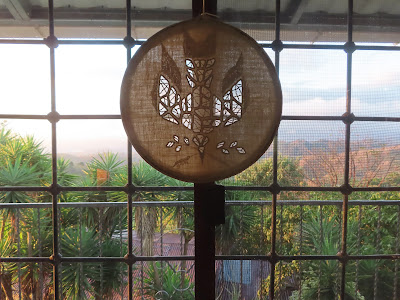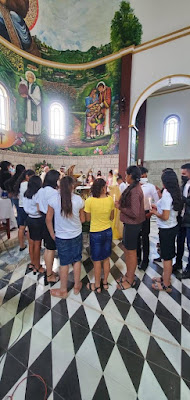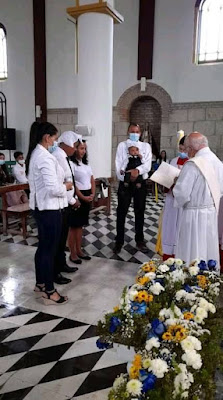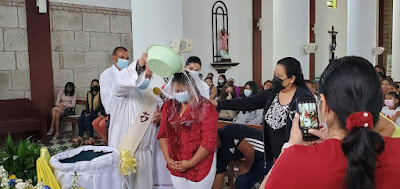Wednesday, January 26, I met with the catechists of confirmation to prepare for confirmations next month, from February 10 to 12. There were about thirty catechists from about 36 towns and villages in the parish who have been preparing about 425 for confirmation. We were preparing the Masses in five different places as well as confessions in six places. I’ll be accompanying them in the next two weeks.
Last Saturday, we had the first round of confessions in the main church in Dulce Nombre. There were about 56 confirmation candidates and some adult sponsors who came; even though there was only one priest, the confessions were finished in about three hours. Among those to be confirmed there were 28 who had not made their first communion. They received the Eucharist for the first time at the Mass at the end of confessions. The pastor also asked me to baptize a couple and their child. I had recently done the final pre-marriage interview with them and I felt privileged to baptize them last Saturday, while the pastor was finishing up confessions. The couple also received their first communion at the Mass. What a day for sacraments – baptisms, confessions, and first communions.January has been a bit different this year. Father Kyle Digmann, the pastor of our sister parish, St. Thomas Aquinas in Ames, Iowa, came for a short visit. He had Mass in two communities, including one of the poorest and most distant, Debajiados. He concelebrated at two of the Sunday Masses and presided at the Mass to dedicate a new meeting space in the parish center, named after St. Thomas Aquinas (since much of the funding came from a donation from St. Thomas). We made a quick trip to the Mayan ruins in Copán Ruinas, about 80 minutes from my house. He had a chance to meet some members of the association that exports El Zapote Coffee to Ames. He even helped a short time with the harvest in the parish coffee field. It was all too short. I hope he and others from St. Thomas will visit in the near future.
Since November people have been harvesting coffee throughout the parish. This will continue until February in most places, though a few who have fields at higher elevations will be harvesting until March.
This year the coffee prices are better than I remember. That means that some harvesters are getting significantly more than last year. Last year they got 30 lempiras (about $1.22 for a five gallon bucket of coffee cherries)’ now some are getting between 40 and 50 lempiras.
But the costs have gone up. Some have told me that in some cases a bag of fertilizer costs about twice as much as a few months ago. We’ll see how this leaves the small coffee producers.
My pastoral work has been a little limited these past months. I try not to schedule many formation meetings in January, since the coffee harvest is one of the few ways people in the countryside can earn cash.
There was a parish assembly to do some planning for the year and there will be two small groups working on parish organization and evangelization in the next few days.
For a number of reasons, exacerbated by the pandemic, the local community church councils have fallen apart in a good number of places; we hope to help revive them, but with an organization more participative than in the past. We also hope to revive the base communities and pastoral work in the towns and villages.
I have continued my custom to go on most Sunday mornings to various villages for Celebrations of the Word with Communion. Yesterday I went to Granadillal and next Sunday I hope to get to visit San Antonio El Alto; I plan to visit the sick after the celebration since they don’t have a communion minister to bring the eucharist to the sick.
One of the customs here is to have prayers in people’s homes on the night after a death, for nine days after the burial, and often for nine days a year after the burial. I was invited to two end of the nine days (novenario) here in Plan Grande. I also celebrated a funeral of an older woman here.
Sunday a week ago, the pastor came for the funeral of a 97 year old man who is sort of the patriarch of the village, with many children (as well as grandchildren and great grandchildren) including two former mayors. I was also asked to be at the vigil on the night before the funeral. I had visited Don Máximo many times, once just before his death. But a local communion minister regularly brought him Communion, which sustained him. He will be missed.
I had two interviews of two couples who will be getting married. I have another one scheduled for February. I find it very hopeful that there are young people who are getting married in the church. Many have already been living together and have kids. They finally decide for one reason or another to get married. One of the more interesting cases is a couple who weren’t even baptized.
I hope there will be even more. The stability that may come from sacramental marriage can be a real blessing for families. this is important for these families, for our parish, and for Honduras.
Other more mundane concerns have taken up time.
I took the new parish truck for its 20,000 kilometer checkup. In less than 14 months I’ve driven more than 20,000 kilometers, mostly in the parish (though there were a few trips to San Pedro Sula). I also had to take another car to the mechanic in Santa Rosa and ended up buying a new battery.
I have reviewed scholarship applications for 159 young people for an alternative program for the equivalent of junior and high school. The students listen to radio programs, have home work in books, and get together with teachers about once a week. Help from St. Thomas Aquinas helps pay for half of the costs of books.
We had a clergy meeting which I attended. We have a deanery meeting in early February.
Such is life in the parish. I’ll try to offer a more reflective blog post after the confirmations are over.
I have not included any reflection at this time on the political situation in Honduras. The country's first woman president was sworn in at the National Stadium in Tegucigalpa in front of an enthusiastic crowd. Her inaugural speech was filled with hopeful signs of a new Honduras. Yet the National Congress is in disarray. Pray that this may be resolved in a way that furthers the good of the people and helps put an end to corruption and impunity.
I'll try to write more about this later.
---
Thanks to Elias for the photos of the baptism and first communion. They were published on the facebook page of the parish.











